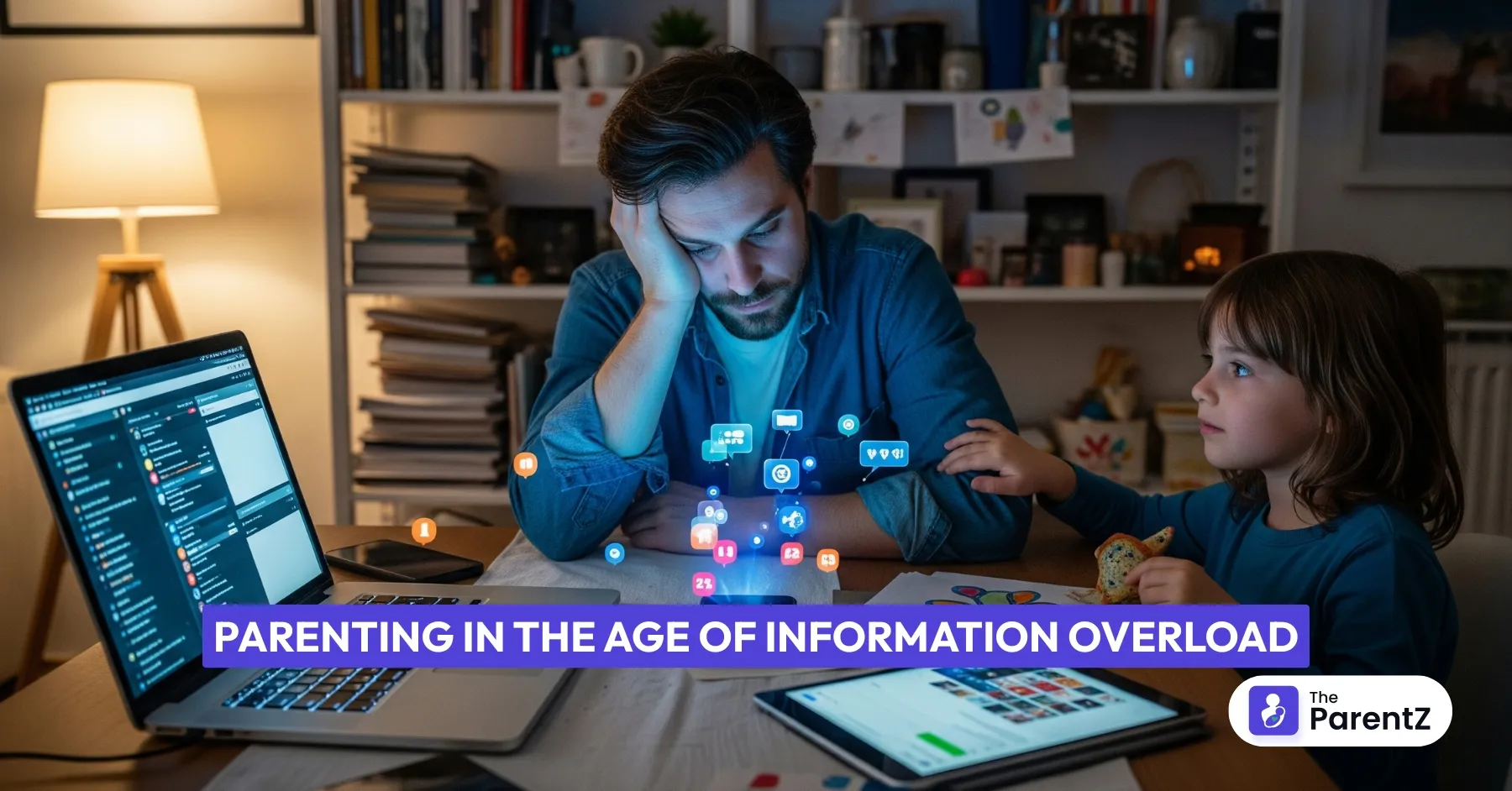Becoming a parent has always come with advice; some useful, some not, and some we never asked for. But in today’s digital world, that advice doesn’t just come from your mom, neighbor, or pediatrician; it pours in from every corner of the internet, every time you pick up your phone.
One search about baby sleep schedules and suddenly your feed is filled with endless “perfect routines,” warning signs, dos, don’ts, and conflicting studies. Even looking up something as simple as “healthy snacks” can take you down a rabbit hole of contradictions: one expert says bananas are a miracle fruit, another says they’re loaded with sugar. Within minutes, what started as curiosity can turn into an overwhelming mess of doubts and fears.
This is what we’re up against as parents today: information overload.
What Exactly Is Information Overload?
Information overload happens when we are exposed to more information than we can process. The internet, and especially social media, has made this our daily reality. We no longer seek information; it finds us, whether we want it or not.
Before, if you wanted to understand colic, you’d ask your doctor or borrow a book. Now, a single late-night Google search about “why is my baby crying?” may leave you convinced your child has a dozen different health conditions you didn’t even know existed.
And it doesn’t stop there. From clothes to food, from toys to school choices, from screen-time rules to teenage friendships, there’s an endless stream of opinions and “expert tips,” often completely contradicting each other.
Why Is Parenting Especially Vulnerable to Overload?
Parenting is emotional. From the moment we see those two pink lines on a test strip, we want to do everything right. We want to protect, nourish, and guide our kids in the best way possible. That natural instinct leaves us more open to advice and also more vulnerable to overwhelm.
And because children go through so many stages like pregnancy, infancy, toddlerhood, school-age years, and teens, parents often feel like they are constantly preparing for the “next challenge.” The fear of missing something important keeps us scrolling, watching, and reading far more than necessary.
The Hidden Cost of Too Much Information
Ironically, instead of making us smarter or calmer, having too much input often has the opposite effect.
- Anxiety: Too much advice makes us question our instincts. We end up second-guessing everything, from breastfeeding to bedtime.
- Fear: We worry about all the “what ifs” we read about online. A harmless rash becomes a sign of something terrible because one post said so.
- Guilt: When confronted with endless “perfect parents” sharing routines, crafts, or healthy recipes, we feel like we’re falling short.
- Decision Fatigue: Even simple choices like what toys to buy or how long to allow screens start to feel exhausting when every decision seems to come with 50 different “scientific” takes.
How We Make It Harder for Ourselves
Sometimes, without realizing it, we dig deeper into the overwhelm. For example:
- Searching endlessly for “the best way” instead of trusting one reliable source.
- Joining too many parenting forums or groups where everyone has a different opinion.
- Following dozens of parenting influencers and comparing every little thing.
- Believing that if we don’t follow a certain method, we’re failing our kids.
These habits pile on unnecessary pressure and take away the joy of simply being present with our children.
How Do We Handle This Overload?
- Know When to Stop Searching: If you find yourself opening the tenth article on the same topic, pause. Ask yourself: “Am I looking for real guidance or just chasing reassurance?” If it’s the second, step away.
- Choose Your Trusted Sources: It doesn’t help to listen to everyone. Instead, pick one or two reliable sources of information, like a pediatrician you trust, maybe one or two websites recommended by professionals. Stick to them.
- Set Boundaries With Social Media: Limit exposure to accounts that make you feel inadequate. Follow those that focus on support and empathy, not perfection.
- Trust Your Gut: No one knows your child better than you. Advice can guide, but your lived experience with your child matters the most.
- Talk to Real People: Sometimes, one conversation with your pediatrician, a close friend, or even your own parent will help more than 50 online articles.
- Remind Yourself: There’s No Perfect Parenting Formula: Every child is unique. What worked beautifully for someone else may not suit your family. That doesn’t make you wrong; it makes you real.
A Gentle Reminder for Parents Everywhere
It’s easy to get lost in the endless advice, articles, and online chatter. Parenting already comes with enough worries, and you don’t need the internet adding more. Breathe. Step back. Listen to your child, listen to yourself, and trust that doing your best is enough.
Yes, milestones, routines, diets, and decisions matter. But what children remember most is not whether you followed the “best” parenting method; it’s how loved and secure you made them feel.
Conclusion
Parenting today means raising children with phones in our pockets and voices from the internet in our ears. But the heart of parenting hasn’t changed. It’s still about connection, love, patience, and presence.
So the next time you feel buried under too much advice, remember: you don’t need to know everything to be a good parent. You just need to know your child, and the rest will fall into place.





Be the first one to comment on this story.